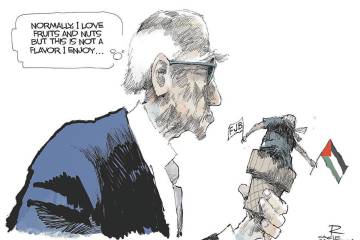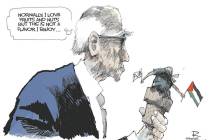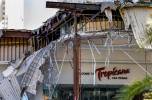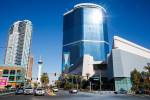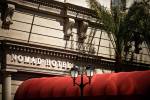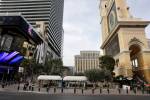EDITORIAL: Kerkorian was Strip visionary, Las Vegas legend
Kirk Kerkorian always bet big on Las Vegas and, ultimately, he always won. The vision of one of the planet’s biggest investors touched nearly every resort on the Strip, growing the city into a global entertainment powerhouse and changing the world’s perception of it.
Las Vegas lost a founding titan Monday night when Mr. Kerkorian, 98, died in Los Angeles after a brief illness. The billionaire rose from poverty to invest in airlines, car companies and film studios throughout his career, but his greatest passion and legacy was Las Vegas, a city he returned to again and again to build hotels and transform gaming companies.
As reported by the Review-Journal’s Howard Stutz, Mr. Kerkorian’s first business with the city came after his service in World War II, when he founded a charter airline to fly gamblers from Los Angeles to Las Vegas. He sold the airline and started buying land around the resort corridor, including the acreage where Caesars Palace now stands. He bought the Flamingo and built the International in 1969, which became better known as the Las Vegas Hilton and today stands as the Westgate, in a direct challenge to Howard Hughes’ casinos. It nearly broke him.
He sold the hotels in 1971, then built the original MGM Grand (now Bally’s) in 1973. He sold that hotel in 1986, and next year bought the Desert Inn and the Sands from what was left of Mr. Hughes’ empire. In 1988, he sold the Sands to Sheldon Adelson, who eventually developed the site into The Venetian and The Palazzo. In 1989, he purchased the Marina and rebuilt it as today’s MGM Grand. In the 2000s, he led MGM Grand’s acquisitions of Steve Wynn’s Mirage Resorts and the Mandalay Resort Group, and he championed the construction of CityCenter.
Mr. Kerkorian died as the largest shareholder in MGM Resorts International, the company that dominates the Las Vegas Strip. Each of the Las Vegas hotels he built opened as the world’s largest. Especially when he opened the International, few people thought he could so greatly increase hotel room inventory and survive. But he believed in the Las Vegas experience and the idea that incredible hotels could fill themselves.
David Schwartz, director of the Center for Gaming Research at UNLV, told Mr. Stutz that Mr. Kerkorian “may have had the biggest impact of any one individual” ever on the Strip, forcing “Las Vegas to think big.”
“Today we accept that the city has a good percentage of the world’s biggest hotels and some of its most profitable casinos, restaurants and nightclubs,” Mr. Schwartz said. “Kerkorian was the first one to think of Las Vegas in those terms and to actually deliver. Without him, our city would be much smaller in many ways.”
Mr. Kerkorian’s story is vintage American. His parents were Armenian immigrants, and he had no formal education past the eighth grade. His upbringing and early life experiences as a boxer, airplane pilot and high-rolling gambler shaped a hungry, risk-taking business acumen that often defied conventional wisdom. He was a self-made man in every sense of the definition, who gave generously to charity. He donated hundreds of millions of dollars to benefit Armenians, and his Lincy Foundation has handed out more than $1 billion.
Mr. Kerkorian and Las Vegas were a perfect fit. His brilliance and unyielding belief in the city will be missed.







